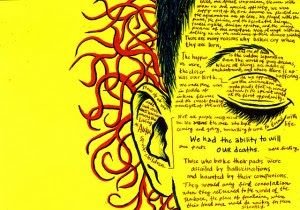Grade 12 English Unit 5: Education (with Grammar Solutions)- Language Development
Reading
A Story of My Childhood
Working with words
A. Match the words in column ‘A’ with their meanings in column ‘B’.
Column 'A' Column 'B'
a. expectantly i. clothes, especially fine or formal ones
b. beckon ii. the way food or drink tastes or feels in your mouth
c. grapple iii. the science of the forces involved in movement
d. texture iv. thin and easily torn
e. cobbled v. to try hard to find a solution to a problem
f. flimsy vi. in a way that shows you are hoping for something,
especially something good or exciting
g. attire vii. having a surface that is made of small round stones
h. marvelous viii. to give the signal to somebody to move nearer or to follow you
i. dynamics ix. extremely good; wonderful
B. An autobiography is a story of a person’s life, written by himself/herself. Use a dictionary and find the meanings of the following words related to people’s life stories.
hagiography- the writing of the lives of saints.
psychobiography- a biographical study focusing on psychological factors, as childhood traumas and unconscious motives.
pathography- the study of the life of an individual or the history of a community with regard to the influence of a particular disease or psychological disorder.
chronicle- a factual written account of important or historical events in the order of their occurrence.
obituary- a notice of a death, especially in a newspaper, typically including a brief biography of the deceased person.
character sketch- a brief written description of a person's qualities.
profile- a short article giving a description of a person or organization.
memoir- a historical account or biography written from personal knowledge.
Grammar
Connectives
A. Study the following sentences and underline the connectives.
a. Although she spoke very fast, I understood what she meant to say.
b. In spite of her hard labour, she failed her exam.
c. Though he had all the required qualifications, he did not get the job.
d. Despite having all the qualifications, he did not get the job.
B. Join the following pairs of sentences twice, using although/though/even though and despite/in spite of as in the example.
Example: Nepali people have limited income. They are very happy.
i. Although Nepali people have limited income, they are happy.
ii. Nepali people are happy in spite of their limited income.
a. He is a millionaire. He lives in a simple house.
i. Although he is a millionaire, he lives in a simple house.
ii. Despite being a millionaire, he lives in a simple house.
b. The weather was extremely bad. The pilot landed the plane safely.
In spite of extremely bad weather, the pilot landed the plane safely.
Although the weather was extremely bad, the pilot landed the plane safely.
c. We study in the same college. We hardly see each other.
Despite studying in the same college, we hardly see each other.
Although we study in the same college, we hardly see each other.
d. It rained heavily. We enjoyed our holiday.
Although it rained heavily, we enjoyed our holiday.
In spite of the heavy rain, we enjoyed our holiday.
e. I had an umbrella. I got wet in the rain.
Despite having an umbrella, I got wet in the rain.
Although I had an umbrella, I got wet in the rain.
f. I was really tired. I could not sleep for a moment.
g. She has a very good accent in English. She failed the interview of a newsreader.
Despite having a very good accent in English, she failed the interview of a newsreader.
Although she has a very good accent in English, she failed the interview of a newsreader.
h. Lhasa has extremely cold weather in winter. Millions of tourists go there in January.
Millions of tourists go to Lhasa in January, even though it has extremely cold weather in winter.
Despite having extremely cold weather in winter, millions of tourists go to Lhasa in January.
i. He was badly injured in the first round of the boxing match. He was victorious in the third round.
In spite of being badly injured in the first round of the boxing match, he was victorious in the third round.
Although he was badly injured in the first round of the boxing match, he was victorious in the third round.
C. Complete each sentence in an appropriate way.
a. He passed the exam although he hadn't prepared well.
b. She climbed the mountain in spite of her leg injury.
c. He did not give any alms to the beggars even though he earned a lot.
d. In spite of his poor eyesight, he is conducting online courses.
e She does not go to parties, though she is very sociable.
f. He could not pass the test, in spite of his ten attempts.
g. He refused to eat anything despite having an appetite.
h. He could not score goods grades in the SEE exams in spite of his hard with private coaching.
i. She accepted the job although she couldn't meet her salary expectation.
j. Even though we had planned everything carefully, we could not complete our mission.
Related Posts
English Unit 4: Technology (with Grammar Solutions)- Language Development
English Unit 3: Sports (with Grammar Solutions)- Language Development
English Unit 2: Family (with Grammar Solutions)- Language Development





Comments
Post a Comment